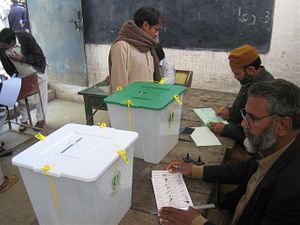The lead-up to the general election in Pakistan—now almost one month away—appears to have set up a launch pad for various extremist groups based in the country. A number of radical groups of all hues and colors have not only launched political campaigns to make inroads into the national parliament, but are also leading efforts to undermine the government’s anti-terror narrative to justify their respective campaign agendas. Certainly, sectarian and other militant groups seem to have obtained strong footing to regain their political, electoral, and social space, which may have come under threat after the last few years’ broad counter terrorism efforts on the part of the Pakistani state.
A few days ago, the head of Jamaat-ud-Dawa (JuD), Hafiz Saeed, led Eid prayers in Lahore, Punjab province’s capital, despite the fact that his organization has been proscribed. A heavy presence of Punjab police other security forces was deployed to guarantee Saeed’s security. In another development, the head of the Ahle Sunnat Wal Jamat (ASWJ), a proscribed militant organization, one of whose followers’ killed Punjab’s former Governor, Salman Taseer, met various politicians at his residence to decide the names of candidates for various constituencies in Punjab. While ASWJ also remains a banned group in Pakistan, the organization and its members are actively taking part in the upcoming general election with their affiliations with various political and religious groups across the country. A number of other sectarian groups actively participated or hosted fundraising events throughout the month of Ramzan.
In another development a week ago, a group of the Pakistani Taliban, which has signed a peace agreement with the Pakistani government, attacked and killed a number of members of the Pashtun Tahaffuz Movement (PTM) in the country’s tribal areas. Since the launch of a military operation in the country’s tribal areas, it has been widely believed that the region has been purged of all sorts of extremist groups. The reports dealing with a groups of Taliban attacking a Pashtun group raising voices for human rights violations committed through various colonial era laws, is a troubling news. Moreover, after the merger of the Federally Administrated Tribal Areas (FATA) into the province of Khyber Pakhtunhwa (KP), it’s likely that armed groups that still continue to find sanctuaries and have local tribal support there may end my up finding space within the country’s parliament.
As it appears, the state believes that radical groups, which have decided not to attack the state apparatus directly, should be given political space in the country. This doesn’t bode well for mainstream political forces in the country. While political groups in Pakistan continue to face pressure from various non-democratic institutions, the narrative of extremist groups which also primarily target civilian forces is only going to increase their social, political, and religious constituencies in the country. Majority of the political campaigns that have been launched by extremist religious groups in Pakistan are not only focused on sectarianizing Islam for electoral gains, but are also focusing on a narrative that shows a conservative vision of the country and attacks any vision of a liberal and progressive Pakistan.
The pressure being built by religious groups is leaving a crucial impact on political parties’ election campaigns. Mainstream political parties in the country have also resorted to same religious tactics to either keep their electoral constitutes intact or to undermine pressure being built by religious groups which have termed political parties campaigns antithetical to the so-called Islamic identity of Pakistan. If one looks at banners and posters which are being put on display across the country ahead of the election, many of them include references to religious texts, promise to transform Pakistan into a true Islamic state, vow to undermine legislative efforts to change the country’s Blasphemy law, and the protection of the country’s so-called Islamic identity are widely visible everywhere. Moreover, political parties are even targeting each other’s electoral constituencies by highlighting or projecting each other’s former legislative efforts focusing on women and minorities rights in a negative image.
It’s possible that some of the radical groups that are contesting elections in Pakistan may end up winning a few seats in the National Assembly (NA). This would only make any future efforts to successfully pass legislation that undermines radical groups’ agendas difficult. The presence of right-wing extremist groups in the parliament will legitimize the extremist narratives of these groups while degenerating the relevancy of democratic forces.
It’s unclear whether the upcoming general election will strengthen the roots of democracy in the country. However, what is certain is that the election will bring radical forces to the center of any debates tied to the future of democracy in Pakistan.

































